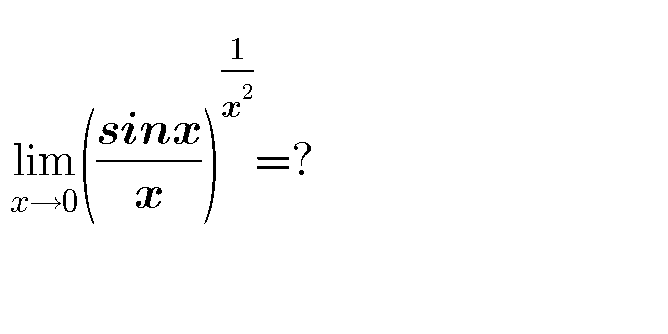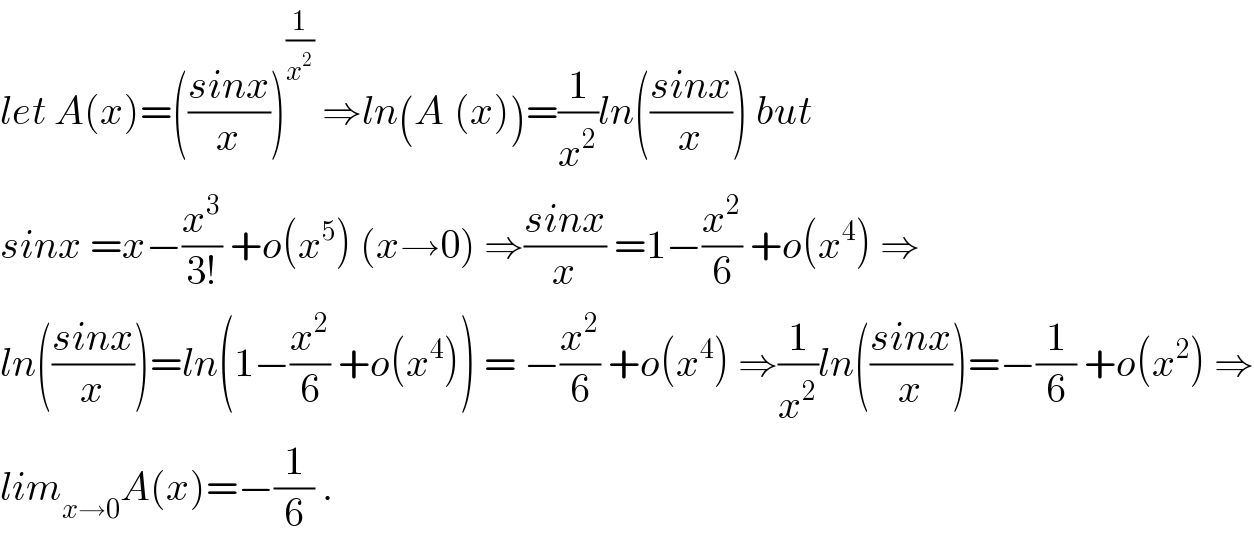Question Number 44795 by behi83417@gmail.com last updated on 04/Oct/18

Commented by maxmathsup by imad last updated on 05/Oct/18

$${let}\:{A}\left({x}\right)=\left(\frac{{sinx}}{{x}}\right)^{\frac{\mathrm{1}}{{x}^{\mathrm{2}} }} \:\Rightarrow{ln}\left({A}_{} \left({x}\right)\right)=\frac{\mathrm{1}}{{x}^{\mathrm{2}} }{ln}\left(\frac{{sinx}}{{x}}\right)\:{but} \\ $$$${sinx}\:={x}−\frac{{x}^{\mathrm{3}} }{\mathrm{3}!}\:+{o}\left({x}^{\mathrm{5}} \right)\:\left({x}\rightarrow\mathrm{0}\right)\:\Rightarrow\frac{{sinx}}{{x}}\:=\mathrm{1}−\frac{{x}^{\mathrm{2}} }{\mathrm{6}}\:+{o}\left({x}^{\mathrm{4}} \right)\:\Rightarrow \\ $$$${ln}\left(\frac{{sinx}}{{x}}\right)={ln}\left(\mathrm{1}−\frac{{x}^{\mathrm{2}} }{\mathrm{6}}\:+{o}\left({x}^{\mathrm{4}} \right)\right)\:=\:−\frac{{x}^{\mathrm{2}} }{\mathrm{6}}\:+{o}\left({x}^{\mathrm{4}} \right)\:\Rightarrow\frac{\mathrm{1}}{{x}^{\mathrm{2}} }{ln}\left(\frac{{sinx}}{{x}}\right)=−\frac{\mathrm{1}}{\mathrm{6}}\:+{o}\left({x}^{\mathrm{2}} \right)\:\Rightarrow \\ $$$${lim}_{{x}\rightarrow\mathrm{0}} {A}\left({x}\right)=−\frac{\mathrm{1}}{\mathrm{6}}\:. \\ $$
Commented by maxmathsup by imad last updated on 05/Oct/18

$${lim}_{{x}\rightarrow\mathrm{0}} {ln}\left({A}\left({x}\right)\right)=−\frac{\mathrm{1}}{\mathrm{6}}\:\Rightarrow{lim}_{{x}\rightarrow\mathrm{0}} \:\:{A}\left({x}\right)={e}^{−\frac{\mathrm{1}}{\mathrm{6}}} \:. \\ $$
Commented by behi83417@gmail.com last updated on 05/Oct/18

$${thank}\:{you}\:{so}\:{much}\:{dear}\:{prop}.{abdo}. \\ $$
Commented by maxmathsup by imad last updated on 05/Oct/18

$${you}\:{are}\:{welcome}\:{sir}\:{behi}. \\ $$
Answered by ajfour last updated on 04/Oct/18

$${let}\:{the}\:{limit}\:{be}\:{L}. \\ $$$$\mathrm{ln}\:{L}\:=\:\underset{{x}\rightarrow\mathrm{0}} {\mathrm{lim}}\left\{\frac{\mathrm{1}}{{x}^{\mathrm{2}} }\mathrm{ln}\:\left(\mathrm{1}−\frac{{x}^{\mathrm{2}} }{\mathrm{6}}+…\right)\right\} \\ $$$$\:\:\Rightarrow\:\:{L}\:=\:{e}^{−\mathrm{1}/\mathrm{6}} \:. \\ $$
Commented by behi83417@gmail.com last updated on 04/Oct/18

$${thank}\:{you}\:{very}\:{much}\:{sir}\:{Ajfour}. \\ $$
